The Best HVAC Service Software
HVAC service software simplifies scheduling, technician management, and customer relations. We’ve identified the leading tools for commercial, residential, and mechanical contractors to help you choose the best fit.
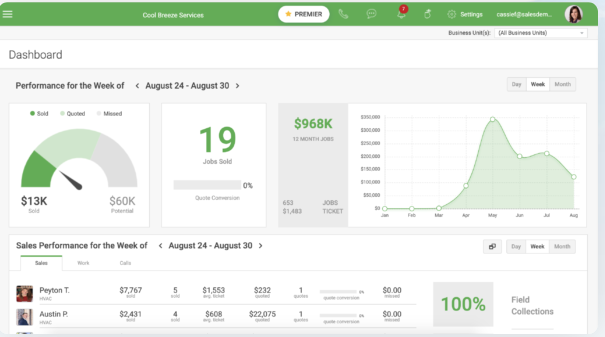
- Create estimates and invoices on mobile app
- QuickBooks Platinum Partner
- Real-time dispatching and financials
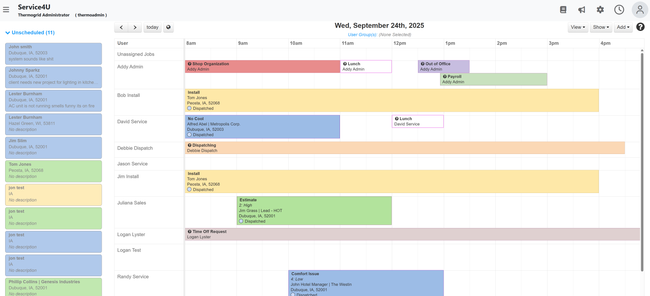
- In-depth catalog of training videos
- Mobile app offers easy access for technicians on-the-go
- Many customization options for personalizing the dispatch board and KPI reporting
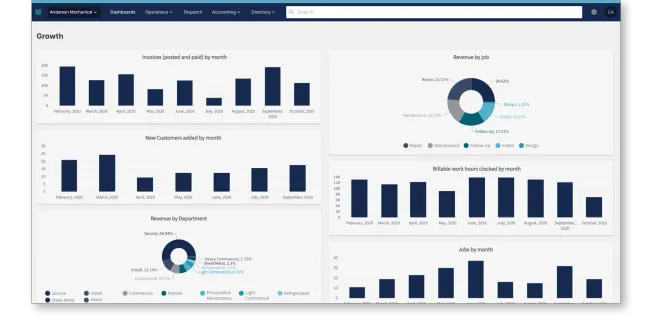
- Integrates with multiple accounting systems
- Includes photo and video notes
- Includes project bids, contracts, daily logs, and change orders
This guide highlights the top HVAC solutions for commercial, residential, emergency, and specialty contractors. Whenever you are looking for advanced scheduling or improved oversight on your technicians, save time and find the best solution for your HVAC service business.
- FieldEdge: Best Overall
- ThermoGrid: Best for Residential
- BuildOps: Best for Commercial Contractors
- FieldMotion: Most Customizable
- Housecall Pro: Best for Online Booking
- P3 HVAC: Strong CRM
- Service Fusion: Best Integrated Fleet Tracking
- WenDuct: Best for Estimating and Takeoffs
- ServiceTitan: Best Contract Management System
- Jobber: Best for On-Demand HVAC Services
FieldEdge - Best Overall
FieldEdge is field service management software that equips small and medium-sized service contractors with tools to increase productivity and provide a better customer experience. For dispatchers or office employees, the system recognizes incoming clients’ contact information and automatically pulls up all previous work order history, allowing your team to provide excellent customer service. For field workers, the included mobile app gives access to the same details, so they have everything they need to complete a job.
FieldEdge includes a fully customizable pricing book enabling technicians or your sales team to offer “good,” “better,” and “best” options for equipment or service purchases. While this feature is only available in the Premier and Elite plans, it helps boost sales by giving customers more choices and presenting proposals professionally. It also makes payment collection easier, as techs can invoice clients in the field and capture their signatures for approval.
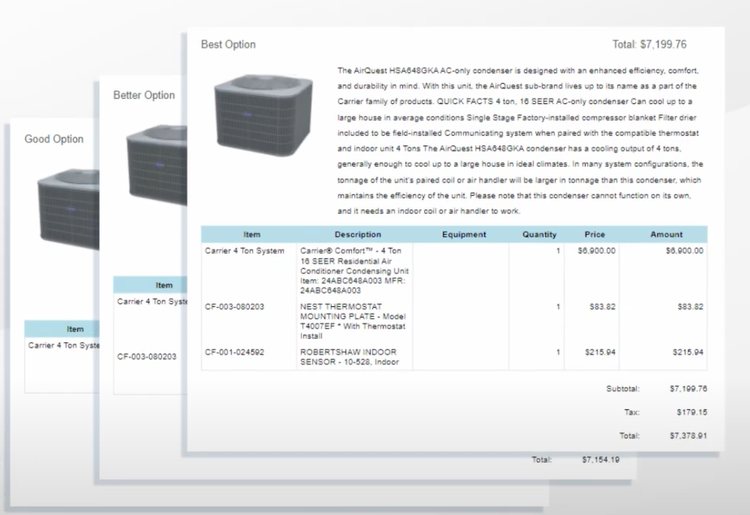
The software simplifies routing and dispatching by assigning technicians to jobs based on their skills, availability, and proximity. Though its route optimization may feel basic compared to systems like ServiceTitan, it remains a strong choice for most contractors. Offering Basic, Premier, and Elite pricing plans, FieldEdge suits residential and commercial HVAC contractors with teams ranging from 2 to 500 employees.
Read our full review of FieldEdge.
ThermoGrid - Best for Residential
ThermoGrid is a cloud-based HVAC service management software with dispatching, invoicing, and CRM modules. Residential contractors often struggle with scheduling and dispatching because of last-minute changes or cancellations by customers. That’s why we found ThermoGrid’s smart dispatching capabilities a great option for residential contractors.
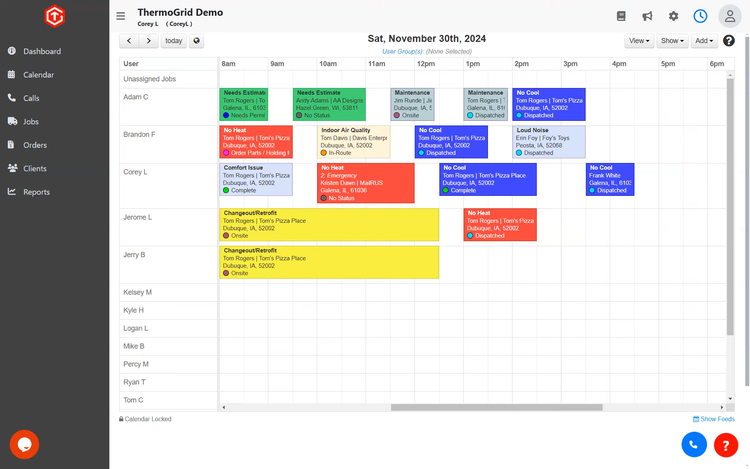
When a customer reschedules or requests service, it’s essential to send the best technician for the job. Unlike other systems that rely solely on location or predetermine skill sets, ThermoGrid optimizes assignments by considering call-back ratios for specific jobs and profitability per call. By analyzing these metrics, businesses can maximize profits per job, minimize callbacks, and turn first-time customers into loyal, long-term clients.
ThermoGrid’s pricing is also a strong benefit for small to medium HVAC contractors, starting at just $60/user/month with a $400 setup fee. It beats out other systems such as Salesforce FSM, which starts at $150/user/month. However, if you are looking for VoIP services to manage your phone lines, expect higher costs and a custom quote based on your unique business.
Read our full review of ThermoGrid.
BuildOps - Best for Commercial Contractors
BuildOps is a comprehensive platform specifically designed for commercial contractors overseeing both ongoing service work and construction tasks. By integrating project and service management into a single solution, BuildOps allows businesses to handle small to large-scale construction projects alongside daily technician dispatching.
This eliminates the need for multiple systems such as Procore and provides a unified view of the entire business, allowing teams to work together across departments.
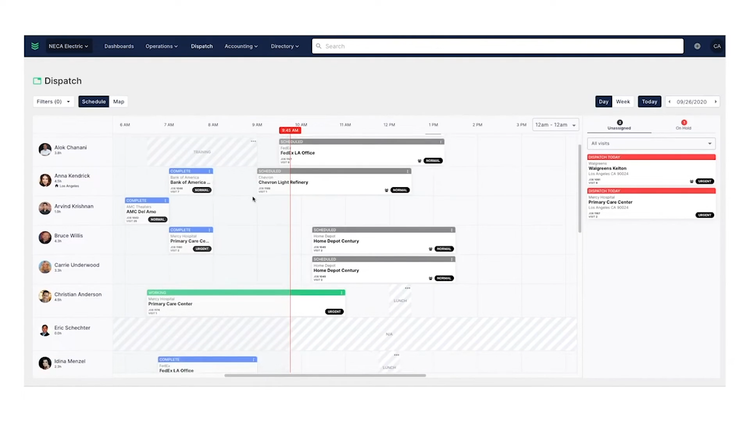
On the construction side, BuildOps offers drag-and-drop Gantt charts for planning project phases, creating dependencies, and adjusting schedules. You can easily track labor hours and manage job costs and budgets for projects of any size. These plans connect directly to the technician dispatch boards, giving dispatchers and office staff an overall view of their employees’ availability. Once the work is complete, you track the installed equipment and assets and ensure that preventive maintenance contracts are followed up.
This then goes right into BuildOps’s service management features, which offer traditional HVAC software features such as quoting customers, dispatching techs, and managing jobs. Its mobile app allows field techs to access important job details, review notes from previous visits, and complete required checklists to close out a job.
Read our full review of BuildOps.
FieldMotion - Most Customizable
FieldMotion is an HVAC field service management software offering configurable workflows for managing your field service jobs. It has multiple different scheduling views, completely customizable job forms, and mobile user permissions to offer your business comprehensive tools for managing jobs from creation to completion.
- The list view lets you see all jobs as a simple list to quickly view what type of jobs are scheduled, the tech assigned, and if the job is completed, overdue, or still in progress.
- The timeline view shows full schedule visibility across the company. This view is sorted by individual employees, and you can view their daily, weekly, or monthly schedules. The system color codes job statuses based on whether the tech is on the way, in progress, or has completed the job.
- The map view shows where each job is on the map. Quickly locate techs actively working and assign new jobs based on proximity.
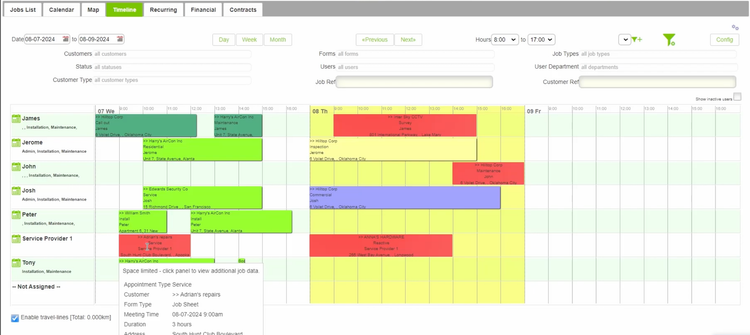
This customization really shines when you start to create and assign jobs. You can quickly set up recurring maintenance jobs with tailored follow-up intervals or just one-time service repairs. FieldMotion will work with you to create personalized forms, health questionnaires, or job checklists to ensure your technicians can easily provide the information to close out a job. This can be as simple as ensuring a client signs off on the work or more complex, like tracking inventory usage or uploading photos.
FieldMotion is an all-in-one field service solution with a built-in CRM, custom reporting, and a full customer portal. Its pricing starts at just $45/user/month, making it very affordable for small and mid-sized HVAC businesses.
Read our full review of FieldMotion.
Housecall Pro - Best for Online Booking
Housecall Pro helps companies streamline operations and improve service scheduling with online booking. The tool allows businesses to capture new customers 24/7, even when no one is in the office, ensuring you never miss out on new business.
The online booking feature has a quick onboarding process, giving you prebuilt price books to use or allows for custom pricing models. It integrates with the “Reserve with Google” feature, which adds a “book” button to your Google Business Profile. This makes it even easier for customers searching for HVAC services to schedule an appointment with just a few clicks.
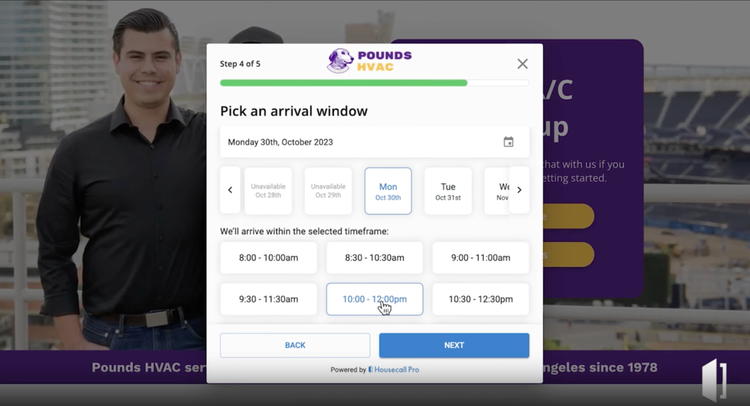
Housecall Pro does not stop at booking; it will automatically sync the details to your calendar, assign a tech to the job, and send confirmation to your customers, eliminating the need for manual follow-ups and reducing scheduling errors. It includes drag-and-drop scheduling and sends texts to customers when a tech is en route.
With flat-rate pricing starting at just $59/month for a single user and $149/month for up to five users, Housecall Pro delivers a complete solution for HVAC companies looking for online booking capabilities. One limitation we noticed is its routing capabilities. Although Housecall Pro includes field technician tracking, it doesn’t update in real-time, and instead, updates happen every few minutes. This is a slight difference compared to systems like Thermogrid, which provide real-time updates.
Read our full review of Housecall Pro.
P3 HVAC - Strong CRM
P3 HVAC is a field service management system built specifically for HVAC service companies. The customer management hub helps you deliver better service to new and existing clients. The central database lets you easily look up important info, like addresses and email, as well as past job history. This helps your techs understand what equipment they’ve used previously and troubleshoot in the field. You can also upload customer lists from QuickBooks Online to view their past invoices for managing repeat business.
The intuitive scheduler also stands out, offering customers 24/7 online appointment booking. It includes an integrated live calendar, so every appointment is reflected on your end to avoid double commitments. If there are any conflicts, you can easily move techs around the calendar to stay on top of calls and ensure smooth transitions between jobs. And with automatic reminders, you’ll receive instant notifications for any emergency bookings.
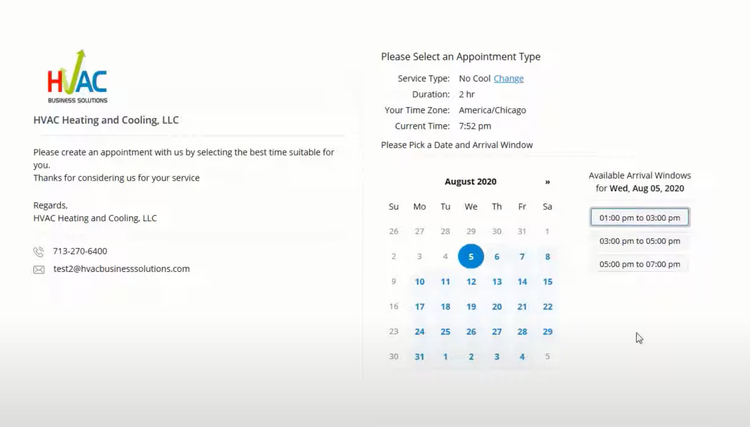
P3 HVAC software is best for small to midsize HVAC companies with 2-50 employees. Pricing starts at $249/month, though you’ll need a custom quote based on how many techs you have and your desired features.
Service Fusion - Best Integrated Fleet Tracking
HVAC businesses often struggle with optimizing routes, tracking fuel costs, and guaranteeing service techs arrive promptly at the job site. Service Fusion stands out with its integrated GPS and fleet tracking tools, offering real-time location data and route optimization to simplify dispatching.
Service Fusion geofences and timestamps job locations for accurate time tracking while preventing unauthorized vehicle usage. Additionally, it monitors your techs’ driving behaviors. You can track a driver’s harsh braking, speeding, and idling to reduce excessive fuel consumption, minimize vehicle wear, and extend your fleet’s lifespan.
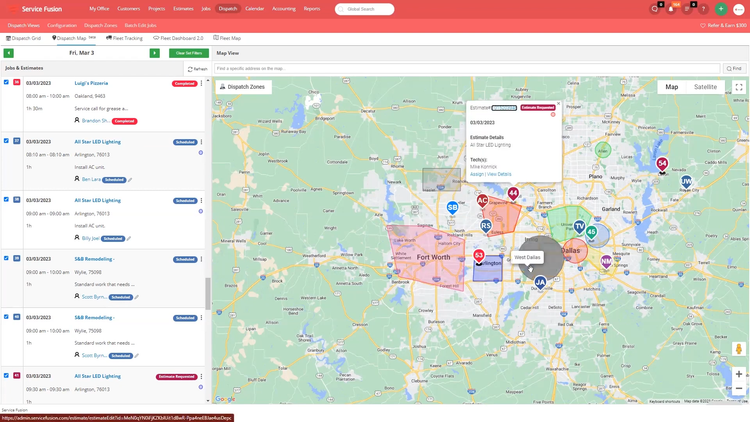
This software improves customer satisfaction and engagement with your business with its “Track My Tech” feature. This allows clients to see a technician’s estimated arrival time, exact location, and even a picture, offering a modern and professional experience whenever they work with you.
These features come as an add-on to Service Fusion’s base package, which starts at $192/month for unlimited users. If you want just the basics without add-ons, check out Intuit FSM, which includes basic GPS tracking out of the box.
Learn more about features and pricing in our Service Fusion review.
WenDuct - Best for Estimating and Takeoffs
WenDuct is for commercial and industrial HVAC contractors, offering fast and precise estimates and take-offs. It allows contractors to import digital project plans and use simple drag-and-drop techniques to quickly calculate both material and labor costs.
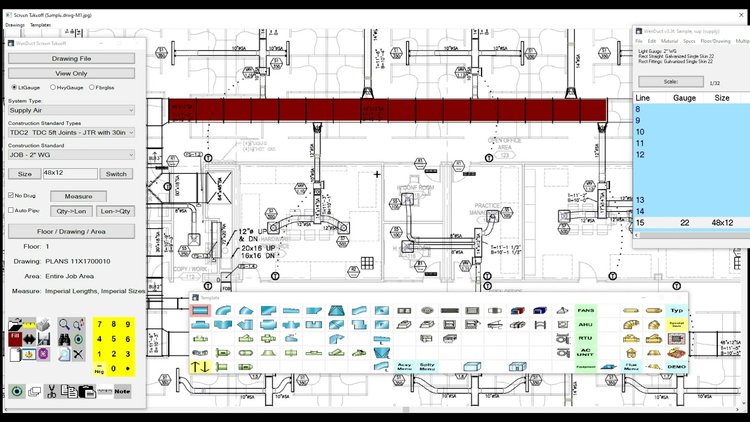
It ensures accurate pricing by integrating with many wholesale providers in the industry, such as Ferguson Enterprises, Harrison, and Trade Services. For labor costing, WenDuct has preloaded its database with national averages and labor rates from the Mechanical Contractors Association of America (MCAA), which are based on industry-specific studies and standards. If using other people’s labor rates is not your thing, WenDuct also lets you create custom labor rates that align with your unique business.
Due to its simple-to-learn interface, most businesses can start bidding on projects the same day. While some users have found WenDuct a bit outdated, the majority find the system simple and easy to learn when compared to programs like McCormick Estimating.
ServiceTitan - Best Contract Management System
ServiceTitan doesn’t just manage recurring visits. It offers a service agreement tool that integrates contract sales, scheduling, materials, billing, and financial tracking into one auditable workflow.
It starts with your admin team setting up a contract template that goes beyond just scheduling; here, they can define how revenue is recognized, using true deferred revenue mapped to GL accounts. Unlike most HVAC tools that stop at “prepaid visit,” ServiceTitan mirrors GAAP standards by triggering revenue movements from liability only when the service is performed. This is especially helpful for commercial HVAC businesses, with high-value agreements that require clean financials.
From there, your staff can build proposals for individual customers, including defining specific equipment, adding not-to-exceed thresholds, tying in SLAs, and assigning account managers to each contract. Then they can set the scope of work, from frequency and timing to renewal rules. Here’s where ServiceTitan truly pulls ahead: you can assign materials to each visit based on seasonal needs, like coils in spring or filters in fall. Those items will automatically appear on the job ticket, streamlining truck prep and pre-visit purchasing planning.
Pricing builds on your estimated labor and material costs, with markups and surcharges layered in to calculate your gross margin in dollars and percentages. That logic flows directly into budget vs. actual reporting upon job completion, giving you closed-loop insight into how profitable each agreement actually is.
While pricing details aren’t available without a quote, ServiceTitan is generally best for medium to large HVAC companies. It falls in our high-tier range for businesses with 50-200 employees, ranging from $25,000 to $100,000 per year.
Check out our page on ServiceTitan for pros, cons, and key features.
Jobber - Best for On-Demand HVAC Services
Jobber condenses scheduling, pricing, and payment into a single workflow that fits the unpredictability of emergency or same-day calls. Its mobile-first estimating and quoting workflow is optimized for quick-turn, high-volume service work, without making your team toggle between tabs or dig through multiple menus.
When your tech finds a critical issue, like a compressor failure during peak summer heat, they can immediately open the Jobber app, select saved client and service details, and build a quote on the spot. On the Grow plan, Jobber expands this functionality with advanced quoting tools: you can personalize each with optional line items, packages, markup tracking, and even line-item images.
Once approved, the quote converts directly into a job or invoice. For fast-paced teams, Jobber tracks when a quote is opened so you can follow up instantly while a customer is still in “decision mode.” You can take payments on-site or online via card reader or the “Client Hub”, which stores communication and work history in one place.
The Grow plan for teams starts at $349/month, billed monthly. It’s ideal for supporting multiple field technicians, two-way SMS tools, and advanced quoting, helping you respond quickly and close more jobs.
See our Jobber review for more details on pros, cons, and pricing.
What is HVAC Software?
HVAC service software is a type of field service management software designed for and used by heating, ventilation, and air conditioning (HVAC) contractors. These systems help with day-to-day operations by automating scheduling, optimizing routes, organizing customers, and managing your workforce. By eliminating manual processes, this software helps contractors work efficiently and deliver better service.
Whether your business focuses on installations, service repairs, ongoing maintenance, or mechanical jobs, adopting software can replace outdated pen-and-paper methods while helping you stay competitive. Even if you’re already using tools like calendars, spreadsheets, or a basic CRM, industry-specific software takes organization and productivity to the next level, empowering you to grow your business proactively.
Modern HVAC software goes beyond the basics, offering real-time technician dispatching, inventory tracking, and mobile access that connects field workers to the office. Many platforms also include customer portals for online booking, along with payment processing and approvals that technicians can handle directly in the field, improving the customer experience. With GPS tracking, route optimizations, and automatic arrival reminders, these systems ensure teams can work more efficiently. By consolidating these tools into one platform, contractors can boost profitability and deliver consistent, high-quality service.
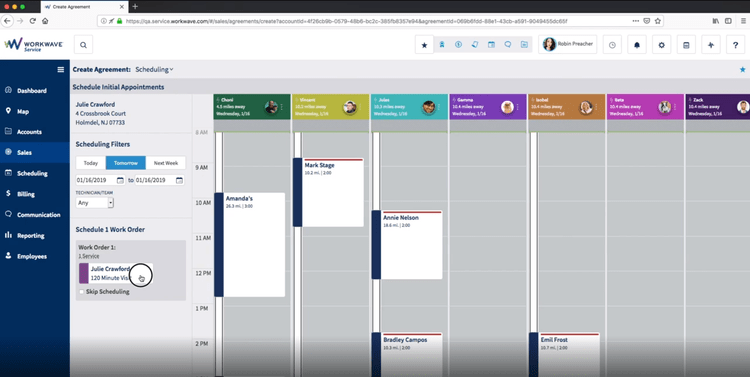
Methodology
We take a customer-friendly approach to assessing software products, ensuring our recommendations reflect real-world needs. Our software reviews are based on a scale where each system is scored across key areas like:
- Customer support
- Ease of use
- Pricing
- Feature set
To determine company scores and overall scores, we used weighted factors that prioritize what matters most for each use case. For example, scheduling and dispatch capabilities carry more weight if you’re a field service company. On the other hand, inventory control is vital for businesses handling large part orders. The type of business, whether commercial, residential, or mixed service, also influences how we rank systems.
Key Features
The main goal of HVAC software is to streamline the management of customers and your workforce and automate your back office tasks. Centralizing essential functions like scheduling, dispatching, and invoicing enables HVAC professionals to focus on delivering quality service.
At a high level, these systems include the following core features:
- Scheduling: Tools to schedule and track jobs with drag-and-drop rescheduling, color-coded calendars, and prevention of overbooking.
- Dispatching: Assign technicians to unscheduled jobs quickly, minimizing downtime and ensuring faster response times for urgent calls.
- Customer Management: Maintain detailed records of service history, equipment, and preferences to enable personalized service and simplify future appointments.
- Mobile Technician Access: Provide technicians with access to job details, updates, and time-tracking tools from any job site.
- Invoicing and Payment Collection: Create and send invoices on-site or via email, collect payments, and secure sign-offs for faster and more reliable transactions.
- Warranty Tracking: Keep accurate records of equipment warranties and receive automated alerts when warranties expire to offer proactive service options.
- Inventory Management: Track HVAC parts and materials, set automated reorder alerts, and streamline purchasing to avoid job delays due to stock shortages.
- Service and Maintenance Agreements: Manage recurring maintenance contracts with tools to track renewals, schedule services, and ensure a steady revenue stream while improving customer retention.

Why Do I Need HVAC Software?
Running an HVAC business requires efficient scheduling, workforce coordination, and top-notch customer service. A quality system streamlines these tasks, improving productivity and customer satisfaction while freeing up time to focus on business growth.
Efficient Scheduling
Scheduling is the backbone of an HVAC business’s success. From balancing routine maintenance, installations, and unexpected repairs, improper scheduling can make managing appointments and jobs a constant challenge. Without a reliable system or team, contractors can risk double booking, missing jobs, or having technicians with a lot of downtime, which all cost the business money.
It replaces manual processes with intuitive tools like drag-and-drop calendars, color-coded schedules, and automated job scheduling that considers an employee’s proximity to the job, their skill sets, and availability. These features reduce unnecessary travel time, increase productivity, and enable contractors to complete more daily jobs without compromising quality.
With HVAC software, customers can enjoy automated appointment reminders and accurate service windows, improving trust and convenience. By providing a seamless scheduling experience, HVAC software streamlines operations and strengthens customer loyalty, positioning contractors as professional and reliable service providers.
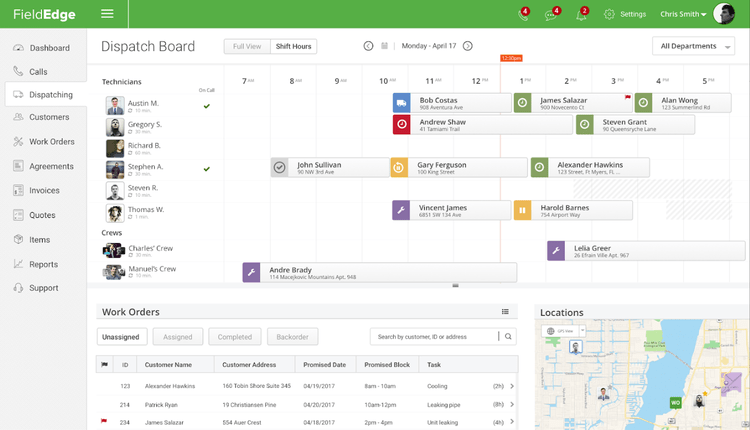
Workforce Management
Effective workforce management is crucial for HVAC contractors that deliver high-quality service to their clients. With 20,000 qualified HVAC techs leaving the industry each year, it’s important to make the most of the employees you currently have. Without a proper system, coordinating a team of technicians, balancing their workloads, and ensuring optimal use of their skills and time can be difficult. Workforce management helps contractors stay organized, improve team performance, and reduce inefficiencies across the board.
Unlike manual spreadsheets or disconnected systems, HVAC software centralizes workforce management, enabling contractors to track performance metrics and identify areas for improvement to more strategically plan their job schedules. Systems like ThermoGrid will track the profitability and customer callbacks each individual tech receives, ensuring that every service visit brings in the most money while keeping clients happy.
Owners and managers can monitor workforce activity in real-time, making it easier to respond to urgent job requests. Automating repetitive tasks like time tracking or client notifications lets owners spend more time growing the business rather than monitoring their team.
Improved Customer Experience
The client’s experience is critical in the HVAC industry, where trust and reliability often determine long-term success and repeat business. Failing to meet expectations risks losing business and negative reviews. Today’s clients expect more than just quality service—they demand convenience, transparency, and timely communication.
HVAC software helps support the customer journey by addressing these with customer-focused features such as automated notifications, online booking, and portals. Automated notifications keep clients informed about technician arrival windows, while online booking and portals offer round-the-clock convenience for scheduling services or reviewing payment or service details.

Who Uses HVAC Software?
Field technicians, office staff, and business owners in the heating, ventilation, and air conditioning industry all rely differently on the software they use. Whether operating in commercial, residential, or industrial settings, these tools improve productivity. Here’s how different roles benefit from using software:
| Role | Daily Responsibilities | Most-Utilized Features |
|---|---|---|
| Office Employees | - Scheduling and dispatching field technicians - Managing customer communications - Processing invoices and payments |
- Scheduling and dispatch tools - CRM - Billing and invoicing features - Reporting and analytics tools |
| Field Technicians | - Performing installations, maintenance, and repairs - Updating job status and notes - Communicating with the office |
- Mobile app for job updates - Work order management - Equipment tracking - Digital forms and photo uploads |
| Owners/Managers | - Overseeing operations and finances - Setting company goals - Reviewing team performance and customer satisfaction |
- Reporting and analytics dashboards - Financial tools (profit/loss tracking) - Customer feedback and satisfaction tools |
Pricing Guide
The cost of HVAC software will depend on the type of business you’re operating, the size of your operations, and the user count. If you operate a large commercial business, you’ll need systems tailored towards your industry and operations, which generally carry a higher price tag than a smaller volume residential contractor.
Low Tier
- Company Size: 1–10 employees
- Average Yearly Cost: $1,000 – $5,000 per year
- Examples: Jobber, ThermoGRID, Housecall Pro, Workiz
Mid Tier
- Company Size: 10–50 employees
- Average Yearly Cost: $5,000 – $25,000 per year
- Examples: ServiceTitan, FieldEdge, Service Fusion, P3 HVAC, 3C Connect
High Tier
- Company Size: 50–200 employees
- Average Yearly Cost: $25,000 – $100,000 per year
- Examples: ServiceTitan, Salesforce Field Service, Oracle Field Service, IFS Field Service
Enterprise Tier
- Company Size: 200+ employees
- Average Yearly Cost: $100K+ per year
- Examples: SAP Field Service Management, ServiceNow Field Service Management, Microsoft Dynamics 365 Field Service
Some vendors offer discounts for longer contract terms, but committing to long-term agreements can make switching providers more challenging if you don’t like the services provided. It’s also important to consider costs that go beyond the subscription fee, such as training integration or customizations. Be sure to ask vendors about these costs to avoid any surprises when purchasing.
Still not sure what’s best? Talk to one of our software advisors for free customized help.




















































